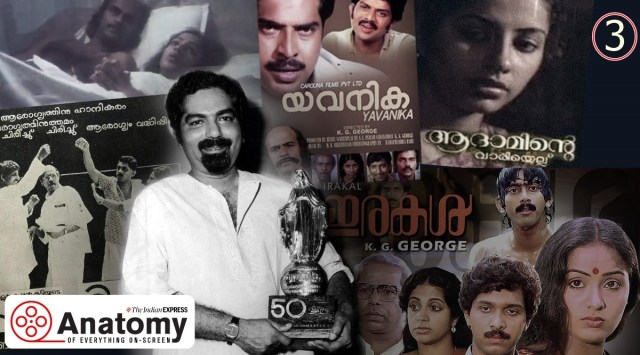One of the most powerful feminist movies India has ever produced, KG George’s Adaminte Variyellu not only exposed the hypocrisies of the Malayali patriarchal society but also showcased the genuine potential of cinema through its impressive technical prowess.
While the film industry was gradually venturing outdoors after years confined to film studios and sets, George boldly delved deep into society’s underbelly to expose its darkest facets. Now, after discussing George’s Yavanika and Lekhayude Maranam Oru Flashback, let’s dissect Adaminte Variyellu and anatomise it to understand how the movie continues to haunt patriarchy even today.

Long before Jeo Baby’s The Great Indian Kitchen shed light on the relentless and circular nature of women’s lives, marked by unending ‘duties’ and internalised misogyny within households, Adaminte Variyellu addressed these issues with great potency and that too through the lives of three women hailing from diverse social and economic backgrounds. At the beginning, the movie asserts that its characters are representatives of countless women through a song.
Even when introducing the names of the cast at the start, George and his team make a deliberate effort to prioritise the names of all the female actors first, aligning with the film’s politics and message, fearlessly disregarding star value, contributing to the film’s enduring appeal, even four decades later.
Watch KG George’s Adaminte Variyellu here:
The movie follows the stories of three women: Vasanthi (Suhasini), a member of a middle-class family whose government job serves as their only income due to her husband’s irresponsibility; Alice (Srividya), who originates from an extremely affluent background; and Ammini (Soorya), a domestic worker employed in Alice’s household. Despite the fact that they come from different economic tiers, the three share the common experience of being exploited by those around them, especially men, particularly sexually and emotionally.
While Vasanthi’s husband (Venu Nagavally) treats her like an ATM and a piece of flesh to satiate his sexual desires, Alice’s husband (Bharath Gopi) uses her as a tool to close deals with powerful men by offering them her body. As a result, Alice lives emotionally detached from her family despite sharing the same house. Ammini, on the other hand, an economically disadvantaged domestic worker who belongs to a marginalised caste, is constantly sexually exploited by Alice’s husband, with an escape nowhere in sight.
By skillfully intertwining physical experiences with their corresponding mental and emotional impacts, Adaminte Variyellu, like all of George’s films, ensures that every character is fully explored. Furthermore, this movie fearlessly delves into and openly portrays various aspects of women’s lives, which are often depicted in a concealed manner due to societal norms even today.
Story continues below this ad
The film presents an authentic portrayal that ranges from Alice’s teenage daughter’s response to her first menstruation and her daydreams about her changing body and the gradual growth of her breasts, to an elderly maid’s attempt to estimate Ammini’s pregnancy age by discussing her recent menstrual cycle, words which were never spoken loudly in Malayalam films until recently. The movie also addresses Alice’s reliance on sleeping pills and alcohol, Vasanthi’s distressing experience of domestic abuse, and a disturbing attempted marital rape by her husband. These unfiltered depictions consistently astonish viewers with their unflinching honesty.
In another notable scene that challenges stereotypes, when Alice’s husband Mamachan, after he impregnated Ammini, attempts to reprimand Alice for continuing her relationship with Jose (Mammootty), citing that their children had reached that age to ‘understand everything’, Alice responds by questioning his certainty about the kids’ paternity, alluding to past instances when he exploited her for financial gain. Alice concludes the conversation with a firm “Podo” akin to “fu** off” as a verbal slap on Mamachan’s face, yet another moment that women never received in films despite deserving completely.
In contrast to the common portrayal by most male filmmakers, George’s Adaminte Variyellu does not depict women as being liberated by male ‘saviours’; instead, he brilliantly shows the women asserting their freedom by breaking free from all forms of bondage on their own.
While Vasanthi and Alice, who come from privileged backgrounds in terms of caste and class, respectively, choose to disconnect from their harsh realities — Vasanthi succumbing to mental health issues and Alice attempting suicide — Ammini, among others who are socially and economically marginalised, face their destinies head-on. They confront not only their fates but also the scrutiny of the audience directly, breaking free by charging toward liberation, and that too in such a powerful manner that they even knock down the film’s own production team, including the cameraman and director KG George himself, breaking the fourth wall too.
Story continues below this ad
The movie showcases the actors delivering some of their most outstanding performances in their respective careers. Adaminte Variyellu also serves as yet another testament to the enduring chemistry between George and Bharath Gopi, a dynamic partnership that never fails to work.
In the realm of KG George’s films, his own presence typically stands as the primary asset, and in the case of Adaminte Variyellu, the script he co-authored with Kallikad Ramachandran takes a close second position, thanks to its remarkable fluidity, even as it employs a parallel narrative technique.
George’s regular collaborators, including cinematographer Ramachandra Babu, composer MB Sreenivasan, and editor MN Appu, each played their roles in Adaminte Vaariyellu too, and it goes without saying that their collective efforts once again shine through as exceptional.
This article is one installment in a five-part series that anatomises five movies by ace Malayalam filmmaker KG George, who passed away on September 24. The series aims to unravel what set him apart as an extraordinary filmmaker




































